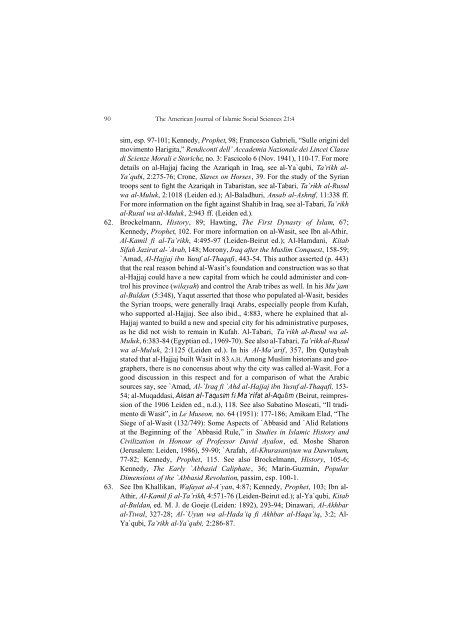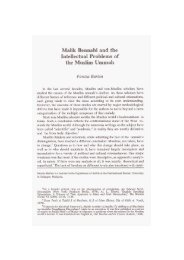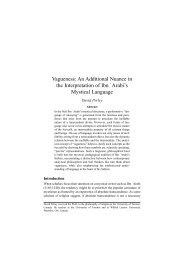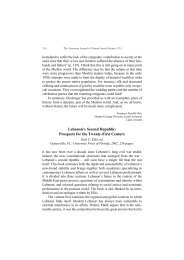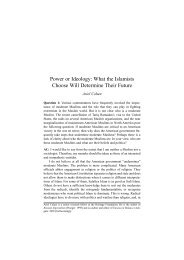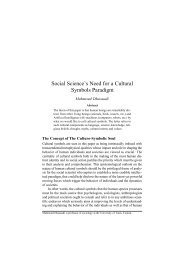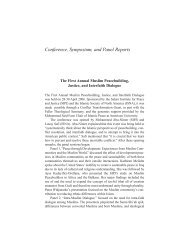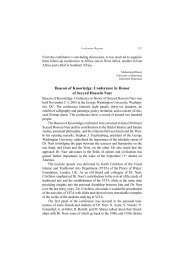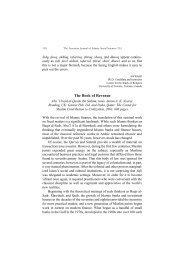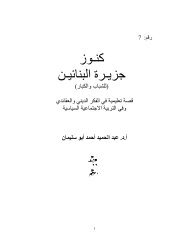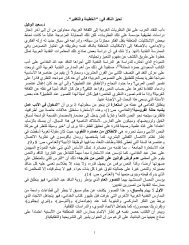Arab Tribes, the Umayyad Dynasty, and the `Abbasid ... - Epistemology
Arab Tribes, the Umayyad Dynasty, and the `Abbasid ... - Epistemology
Arab Tribes, the Umayyad Dynasty, and the `Abbasid ... - Epistemology
Create successful ePaper yourself
Turn your PDF publications into a flip-book with our unique Google optimized e-Paper software.
90 The American Journal of Islamic Social Sciences 21:4<br />
sim, esp. 97-101; Kennedy, Prophet, 98; Francesco Gabrieli, “Sulle origini del<br />
movimento Harigita,” Rendiconti dell’ Accademia Nazionale dei Lincei Classe<br />
di Scienze Morali e Storiche, no. 3: Fascicolo 6 (Nov. 1941), 110-17. For more<br />
details on al-Hajjaj facing <strong>the</strong> Azariqah in Iraq, see al-Ya`qubi, Ta’rikh al-<br />
Ya`qubi, 2:275-76; Crone, Slaves on Horses, 39. For <strong>the</strong> study of <strong>the</strong> Syrian<br />
troops sent to fight <strong>the</strong> Azariqah in Tabaristan, see al-Tabari, Ta’rikh al-Rusul<br />
wa al-Muluk, 2:1018 (Leiden ed.); Al-Baladhuri, Ansab al-Ashraf, 11:338 ff.<br />
For more information on <strong>the</strong> fight against Shahib in Iraq, see al-Tabari, Ta’rikh<br />
al-Rusul wa al-Muluk, 2:943 ff. (Leiden ed.).<br />
62. Brockelmann, History, 89; Hawting, The First <strong>Dynasty</strong> of Islam, 67;<br />
Kennedy, Prophet, 102. For more information on al-Wasit, see Ibn al-Athir,<br />
Al-Kamil fi al-Ta’rikh, 4:495-97 (Leiden-Beirut ed.); Al-Hamdani, Kitab<br />
Sifah Jazirat al-`<strong>Arab</strong>, 148; Morony, Iraq after <strong>the</strong> Muslim Conquest, 158-59;<br />
`Amad, Al-Hajjaj ibn Yusuf al-Thaqafi, 443-54. This author asserted (p. 443)<br />
that <strong>the</strong> real reason behind al-Wasit’s foundation <strong>and</strong> construction was so that<br />
al-Hajjaj could have a new capital from which he could administer <strong>and</strong> control<br />
his province (wilayah) <strong>and</strong> control <strong>the</strong> <strong>Arab</strong> tribes as well. In his Mu`jam<br />
al-Buldan (5:348), Yaqut asserted that those who populated al-Wasit, besides<br />
<strong>the</strong> Syrian troops, were generally Iraqi <strong>Arab</strong>s, especially people from Kufah,<br />
who supported al-Hajjaj. See also ibid., 4:883, where he explained that al-<br />
Hajjaj wanted to build a new <strong>and</strong> special city for his administrative purposes,<br />
as he did not wish to remain in Kufah. Al-Tabari, Ta’rikh al-Rusul wa al-<br />
Muluk, 6:383-84 (Egyptian ed., 1969-70). See also al-Tabari, Ta’rikh al-Rusul<br />
wa al-Muluk, 2:1125 (Leiden ed.). In his Al-Ma`arif, 357, Ibn Qutaybah<br />
stated that al-Hajjaj built Wasit in 83 A.H. Among Muslim historians <strong>and</strong> geographers,<br />
<strong>the</strong>re is no concensus about why <strong>the</strong> city was called al-Wasit. For a<br />
good discussion in this respect <strong>and</strong> for a comparison of what <strong>the</strong> <strong>Arab</strong>ic<br />
sources say, see `Amad, Al-`Iraq fi `Ahd al-Hajjaj ibn Yusuf al-Thaqafi, 153-<br />
54; al-Muqaddasi, Ahsan al-Taqasim fi Ma`rifat al-Aqalim (Beirut, reimpression<br />
of <strong>the</strong> 1906 Leiden ed., n.d.), 118. See also Sabatino Moscati, “Il tradimento<br />
di Wasit”, in Le Museon, no. 64 (1951): 177-186; Amikam Elad, “The<br />
Siege of al-Wasit (132/749): Some Aspects of <strong>`Abbasid</strong> <strong>and</strong> `Alid Relations<br />
at <strong>the</strong> Beginning of <strong>the</strong> <strong>`Abbasid</strong> Rule,” in Studies in Islamic History <strong>and</strong><br />
Civilization in Honour of Professor David Ayalon, ed. Moshe Sharon<br />
(Jerusalem: Leiden, 1986), 59-90; `Arafah, Al-Khurasaniyun wa Dawruhum,<br />
77-82; Kennedy, Prophet, 115. See also Brockelmann, History, 105-6;<br />
Kennedy, The Early <strong>`Abbasid</strong> Caliphate, 36; Marín-Guzmán, Popular<br />
Dimensions of <strong>the</strong> <strong>`Abbasid</strong> Revolution, passim, esp. 100-1.<br />
63. See Ibn Khallikan, Wafayat al-A`yan, 4:87; Kennedy, Prophet, 103; Ibn al-<br />
Athir, Al-Kamil fi al-Ta’rikh, 4:571-76 (Leiden-Beirut ed.); al-Ya`qubi, Kitab<br />
al-Buldan, ed. M. J. de Goeje (Leiden: 1892), 293-94; Dinawari, Al-Akhbar<br />
al-Tiwal, 327-28; Al-`Uyun wa al-Hada’iq fi Akhbar al-Haqa’iq, 3:2; Al-<br />
Ya`qubi, Ta’rikh al-Ya`qubi, 2:286-87.


